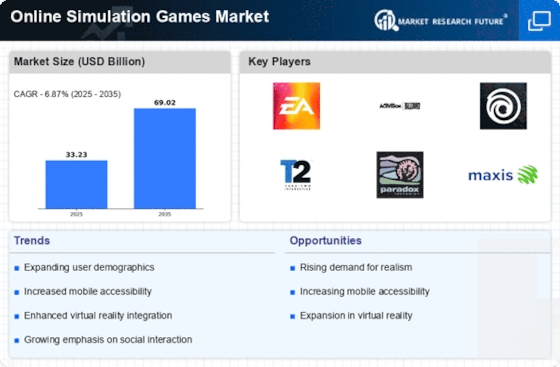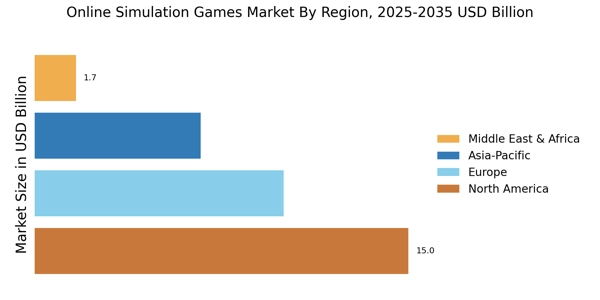Advancements in Technology
The Online Simulation Games Market is experiencing a notable surge due to rapid advancements in technology. Innovations in graphics, artificial intelligence, and virtual reality are enhancing the gaming experience, making it more immersive and engaging. For instance, the integration of AI allows for more realistic non-player character behavior, which enriches gameplay. As technology continues to evolve, developers are likely to create more sophisticated simulation games that attract a wider audience. The market is projected to grow at a compound annual growth rate of approximately 10% over the next five years, indicating a robust demand for technologically advanced simulation games.
Rise of User-Generated Content
The Online Simulation Games Market is experiencing a rise in user-generated content, which is reshaping the gaming landscape. Players are increasingly creating and sharing their own content, such as custom scenarios and mods, which enhances the longevity and replayability of simulation games. This trend fosters a vibrant community around simulation games, encouraging collaboration and creativity among players. As developers recognize the value of user-generated content, they are likely to implement tools that facilitate this process, further enriching the gaming experience. This shift not only boosts player engagement but also contributes to the overall growth of the market.
Expansion of Esports and Competitive Gaming
The Online Simulation Games Market is significantly influenced by the expansion of esports and competitive gaming. As more players engage in competitive formats, simulation games that offer multiplayer capabilities are gaining traction. This trend is supported by the increasing number of esports tournaments and the growing viewership of gaming events. The market for simulation games that can be played competitively is likely to expand, attracting both players and sponsors. This competitive aspect not only enhances player engagement but also drives revenue through sponsorships and advertising, indicating a promising future for the simulation gaming sector.
Increased Accessibility of Gaming Platforms
The Online Simulation Games Market benefits from the increased accessibility of various gaming platforms. With the proliferation of smartphones, tablets, and affordable gaming consoles, a broader demographic can engage with simulation games. This accessibility is further enhanced by the rise of cloud gaming services, which allow players to access high-quality games without the need for expensive hardware. As a result, the market is witnessing a diversification of its user base, with more casual gamers participating. This trend is expected to contribute to a significant increase in market revenue, potentially reaching billions in the coming years.
Growing Interest in Educational Simulation Games
The Online Simulation Games Market is witnessing a growing interest in educational simulation games. These games are designed to provide learning experiences in a fun and interactive manner, appealing to both students and educators. The rise of remote learning and digital education tools has further fueled this trend, as educational institutions seek innovative ways to engage students. According to recent data, the educational simulation segment is projected to account for a substantial share of the market, reflecting a shift towards gamified learning solutions. This trend not only enhances the appeal of simulation games but also expands their application in various educational settings.

















